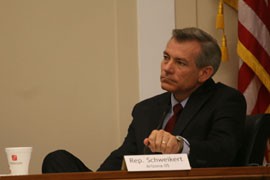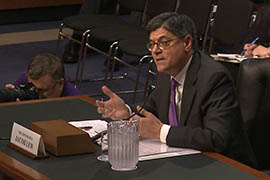Cronkite News has moved to a new home at cronkitenews.azpbs.org. Use this site to search archives from 2011 to May 2015. You can search the new site for current stories.
Lew warns of debt-limit catastrophe; Schweikert says that’s not so
WASHINGTON – Treasury Secretary Jacob Lew warned Thursday of a “potentially catastrophic” hit to the economy if the nation reaches the debt limit next week and defaults on its obligations.
Lew’s testimony to the Senate Finance Committee came a week after a separate Treasury report said a U.S. default on its debt could bring about a recession echoing 2008 and produce shockwaves that “could reverberate around the world.”
But Rep. David Schweikert, R-Scottsdale, is having none of it.
“It is implausible the United States would ever default,” he said. “The math makes that clear.”
Schweikert is one of a growing number of Republicans who insist the country will not default if it hits the debt limit, and he accused Lew and President Barack Obama of using the word “default” as a scare tactic. In speeches on the House floor, in public appearances and in a letter this week to Lew, Schweikert has insisted that the U.S. has options that do not require raising the debt limit.
The back-and-forth came Thursday as House leaders offered a plan for a short-term extension of the debt limit. Speaker John Boehner offered Obama a deal to raise the debt limit for six weeks if the president would negotiate with Republicans on the budget, which could end the government shutdown.
The White House has refused to negotiate while the government is shut down and was noncommittal Thursday to Boehner’s debt-ceiling plan.
The debt ceiling is the amount of debt the government can have at one point. The country hit the current limit of $16.699 trillion in May, but the Treasury Department has taken “extraordinary measures” since then to keep the U.S. from defaulting.
But the Treasury estimates that it will exhaust those measures by Oct. 17, and soon after that the U.S. would not be able to pay all of its bills. It would default, Lew said.
But “default,” to Schweikert, means that the U.S does not pay interest on its debt. Schweikert said the government will still be able to pay the interest on its debt, even without raising the limit, but will have to make cuts elsewhere – or find new revenues.
“The federal government holds several trillion dollars worth of assets,” Schweikert said. “Why don’t we just sell some of them?”
But Lew said ideas like Schweikert’s are impossible to implement.
“How can the United States choose whether it sends Social Security checks to seniors or pay benefits to veterans?” Lew testified. “There is no way of knowing the irrevocable damage such an approach would have on our economy and financial markets.”
Besides being legally questionable, Lew said it is impossible for the Treasury Department’s computer systems to prioritize payment of bills.
“You cannot go into the system, and easily make it pay something and not pay other things, they were not designed that way,” Lew said.
Schweikert noted that the House in May passed a bill to prioritize government payments, but it stalled in the Senate.
“The House actually passed a prioritization bill, that made it clear that we always pay our interest first,” he said. “And one more time, it gets over to the Senate and it disappears in (Senate Majority Leader) Harry Reid’s drawer.”
But Lew said he does not feel comfortable with a law saying what gets paid and what doesn’t when the debt limit is reached.
“Prioritization is just default by another name,” he said.
Senate Republicans at Thursday’s hearing repeatedly said the U.S. needs to lower its debt, and Lew agreed. But he said that is not the issue right now.
The debt limit does not have anything to do with future spending, Lew said, but it is to meet the financial obligations that Congress has already made.
“Failing to raise the debt limit would not make these bills disappear,” he said.
Most economists agree with Lew. In a report Thursday, Center for American Progress economist Michael Madowitz wrote that “all Americans will be affected by the ripple effects in credit markets” if the debt limit is exceeded.
Madowitz said interest rates for credit cards, auto loans, mortgages and student loans are connected to interest rates on U.S. Treasury-issued debt and would increase if the nation defaulted on those debts.








